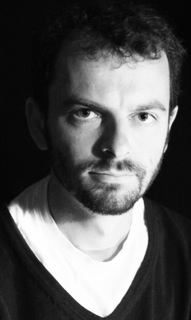 |
| photo: Damien Sass |
Irishman Aidan Harte was studying classical sculpture in Florence when he began writing Irenicon (Jo Fletcher/Quercus, April 1, 2014), a historical fantasy set in medieval Italy. Irenicon was shortlisted for the David Gemmell Morningstar Award for best debut, and Lawrence Osborne called Harte "a brilliant new voice in historical fantasy." In a previous life, Harte created the show Skunk Fu for the BBC and Cartoon Network. His sculpture can be viewed at the Sol Art Gallery in Dublin, the Sculpture Company in London and at aidanharte.com.
On your nightstand now:
The Slave by Isaac Bashevis Singer. This short novel, set in the 17th century, is about a Polish Jew whose family is murdered in a pogrom and is subsequently enslaved by brutal peasants. It doesn't sound it, but this is a gentle love story infused by melancholy wisdom. Singer wrote The Slave in the early '60s when the world was still realizing the scale of the Holocaust. It's an example of how the best writing is rooted in its time and transcends it. The Slave looks obliquely at the horror and--remarkable thing--finds some solace in the darkness.
Singer was a funny guy. He said he kept writing in Yiddish because ghost stories ought to be told in dying languages.
Favorite book when you were a child:
The Man Who Was Thursday by G.K. Chesterton. Clearly it was an odd child that relished this quixotic mix of paranoia, farce and theology. I continue to reread it annually. I think something of the memorable finale, where the protagonist confronts God, found its way into [my] Wave Trilogy.
Your top five authors:
Impossible! Irenicon is more grounded in history than most fantasy, so let me narrow it down to writers of historical fiction: Shakespeare, Patrick O'Brian, Cormac McCarthy, Neal Stephenson and Hilary Mantel. Besides being idiosyncratic stylists, all of the above do justice to their characters: they do not condescend. It's sometimes hard to imagine, but the gentlemen and women in the graveyards were every bit as contented and aggrieved as we are.
Book you've faked reading:
"Faked" is so damning. What about those books that you haven't read but convince yourself you have? They're like islands you haven't visited yet but you know the coastline intimately. Do they count? Can you triangulate a book if you're read the work that inspired it, and the work it inspired? Gabriel García Márquez's Macondo is a few miles beyond the Castle of Kafka, but if you get to Allende's House of Spirits you've gone too far. Of course, the fun of actually visiting is watching our preconceptions shatter. Dodging the question? Damn right I am. Next!
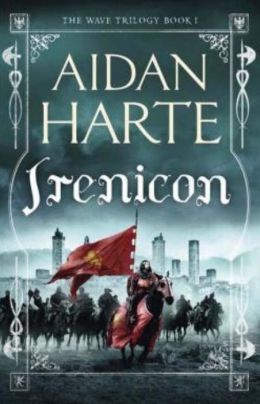 Book you're an evangelist for:
Book you're an evangelist for:
The Stars My Destination by Alfred Bester. That book's got brio. I'm currently writing a sci-fi [novel]--my first--and Bester's rapid pacing is my ideal.
Science fiction goes through fallow periods where authors feel duty-bound to educate readers on contemporary physics, but lengthy technical exposition makes lousy science and lousy fiction. It reads like a textbook, and not accidentally--that's what it aspires to be. Happily, hard science fiction dates swiftly, so a new generation comes along that realizes being entertaining isn't sinful. That's what made William Gibson's Neuromancer such an event. Sure, all that cyberpunk tech was rad, but the book moves. You can feel the spirit of Bester pumping adrenaline into every line. I think we're due another shot.
Book you've bought for the cover:
I rarely pick books for their covers. Perverse, I suppose, since my other job is visual art. I love those old Penguins with the orange stripe and title and author written in the same functional typeface. No sales pitch, just the facts. It's like keeping a secret from the world. That said, I was hooked by the covers of the Pocket Canons. This was a series by Pentagram reprinting books of the Bible in a pocket-sized edition. The cover of Job was an old bum in the street, Isaiah was a building being shredded by a hurricane and Exodus was a grainy Polaroid taken from a car on an endless motorway. I'm a sucker for killer titles, however. No way could I leave Robert A. Heinlein's The Moon Is a Harsh Mistress on the shelf. As I recall, the cover illustration was an airbrushed nightmare--chrome space ships buzzing about a lemon crescent. Oh my, it was nasty, but that only sealed the deal: it's an iron law of science-fiction that the more luridly terrible the cover, the better the book contained therein.
Book that changed your life:
You find Melville or Hemingway growing up and you think, well, that's fine, but no one's that good today. I did, anyway. There's a three-page passage in Cormac McCarthy's All the Pretty Horses where two Texas boys working on a hacienda break 16 mustangs over four long days. All McCarthy does is tell you what happens. Not a single line tells you how to feel about it. It kills me every time.
Favorite line from a book:
"Man is born unto trouble as the sparks fly up." --Job 5:7. Ain't that the truth.
Book you most want to read again for the first time:
With densely wrought books, like Moby-Dick, you find treasure each reading. Indeed, it's part of their design. So the first time is necessarily the most superficial. The tales I'd love to experience afresh are short stories. Shirley Jackson's The Lottery springs to mind. That first time hurts sweeter than a paper cut.
What we can expect from the next installment of the Wave Trilogy:
Peace. War. Not necessarily in that order.
 Retailers used aggressive discounting "to lure bargain-conscious shoppers into stores last month, helping the industry post better-than-feared sales, despite this year's late Easter, which stands to benefit April sales more than it did March's," the Wall Street Journal reported. For the month, sales at stores open at least a year increased 2.2% at the eight retailers tracked by Thomson Reuters, compared with projections of 1.4% growth and a 2.7% jump last year.
Retailers used aggressive discounting "to lure bargain-conscious shoppers into stores last month, helping the industry post better-than-feared sales, despite this year's late Easter, which stands to benefit April sales more than it did March's," the Wall Street Journal reported. For the month, sales at stores open at least a year increased 2.2% at the eight retailers tracked by Thomson Reuters, compared with projections of 1.4% growth and a 2.7% jump last year.




SHELFAWARENESS.1222.S1.BESTADSWEBINAR.gif)



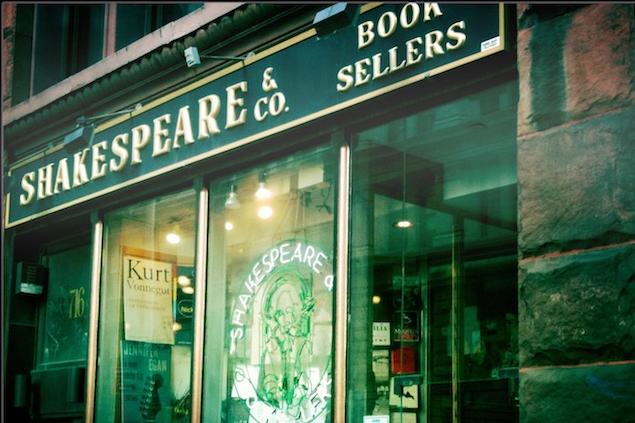 Shakespeare & Co. Booksellers
Shakespeare & Co. BooksellersSHELFAWARENESS.1222.T1.BESTADSWEBINAR.gif)
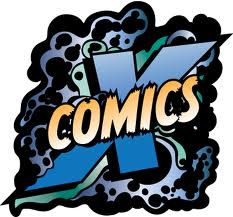 Amazon has reached an agreement to acquire
Amazon has reached an agreement to acquire 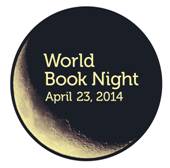 World Book Night U.S. has a range of plans involving e-books. This year, it is making available for free to all givers The World Book Night 2014 E-book: An Original Collection of Stories and Essays by Booksellers, Librarians, and Authors. The e-book contains 10 pieces by past givers, and will be available for two weeks, beginning April 22, accessible for download to any device with a web browser as well as downloadable as a PDF to print.The
World Book Night U.S. has a range of plans involving e-books. This year, it is making available for free to all givers The World Book Night 2014 E-book: An Original Collection of Stories and Essays by Booksellers, Librarians, and Authors. The e-book contains 10 pieces by past givers, and will be available for two weeks, beginning April 22, accessible for download to any device with a web browser as well as downloadable as a PDF to print.The 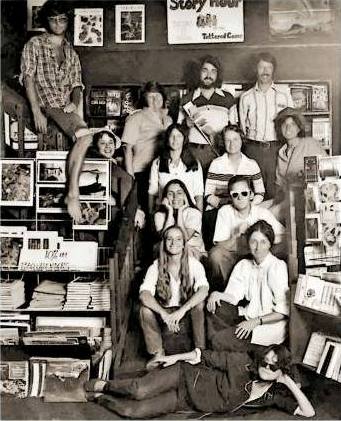 From the Facebook page yesterday of
From the Facebook page yesterday of 
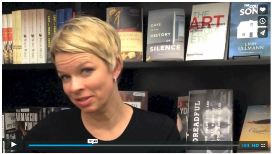

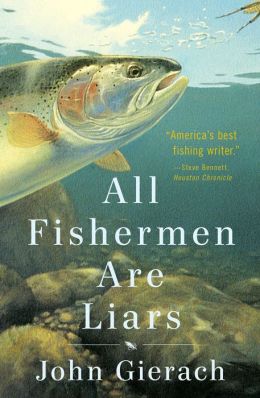 Real fishing, fly-fishing, is done mostly alone and in the wild, and John Gierach is to fishing what Roger Angell is to baseball--a seasoned observer who writes with knowledge, humor and a touch of reverence. Gierach, author of the classic Standing in a River Waving a Stick and many other fishing books, describes his days as a professional fishing writer in the first chapter of All Fishermen Are Liars with characteristic self-deprecating humor: "The worst that happens is that you occasionally go fishing without turning a profit: something normal people do every day."
Real fishing, fly-fishing, is done mostly alone and in the wild, and John Gierach is to fishing what Roger Angell is to baseball--a seasoned observer who writes with knowledge, humor and a touch of reverence. Gierach, author of the classic Standing in a River Waving a Stick and many other fishing books, describes his days as a professional fishing writer in the first chapter of All Fishermen Are Liars with characteristic self-deprecating humor: "The worst that happens is that you occasionally go fishing without turning a profit: something normal people do every day."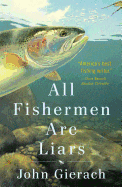
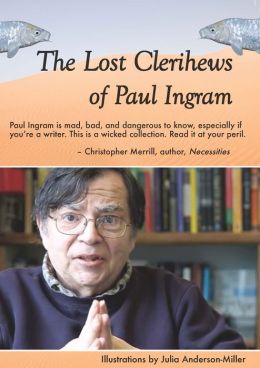 From Ingram's introduction to his collection, I soon discovered the clerihew was first devised by English author Edmund Clerihew Bentley and follows the rhyme scheme AABB, with the first line including "the name of a well-known or ill-known person." Since Bentley's death in 1956, and despite its adoption by poets like
From Ingram's introduction to his collection, I soon discovered the clerihew was first devised by English author Edmund Clerihew Bentley and follows the rhyme scheme AABB, with the first line including "the name of a well-known or ill-known person." Since Bentley's death in 1956, and despite its adoption by poets like 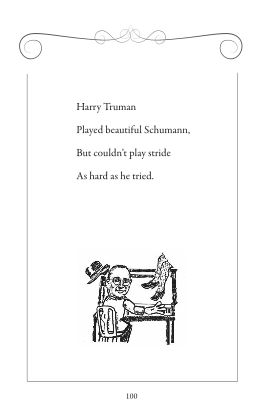 In his blurb for the collection, Richard Howorth, co-owner of Square Books, Oxford, Miss., called Ingram "an extraordinary bookseller who has not only found the lost clerihews; he has elevated the entire form. This book forever shall reside in our guest bedroom so that visitors will either know or wonder what sort of people we are."
In his blurb for the collection, Richard Howorth, co-owner of Square Books, Oxford, Miss., called Ingram "an extraordinary bookseller who has not only found the lost clerihews; he has elevated the entire form. This book forever shall reside in our guest bedroom so that visitors will either know or wonder what sort of people we are."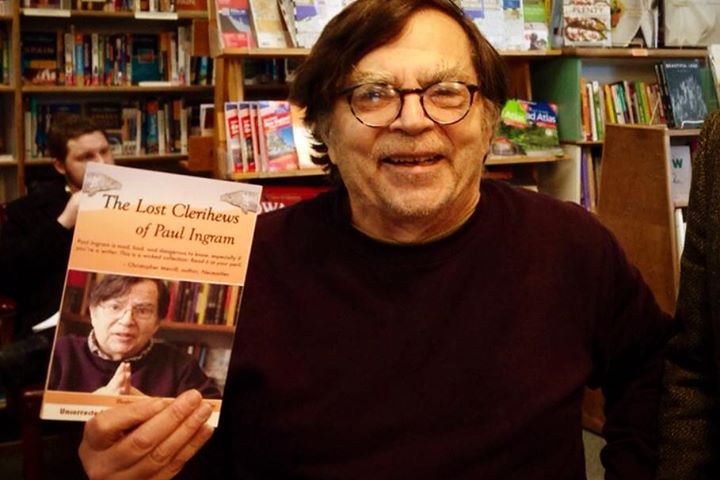 "Having an illustrated clerihew book is 'how it's done,' " Semken observed. "Auden's was illustrated, as was E. Clerihew Bentley's clerihew book. This really is a valuable part of the book, I think."
"Having an illustrated clerihew book is 'how it's done,' " Semken observed. "Auden's was illustrated, as was E. Clerihew Bentley's clerihew book. This really is a valuable part of the book, I think."